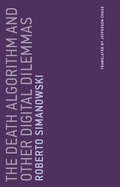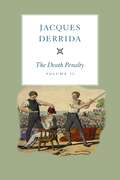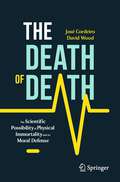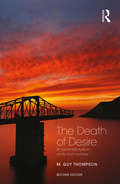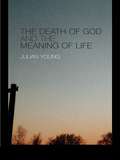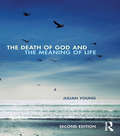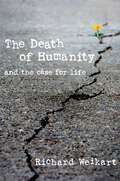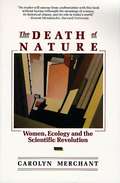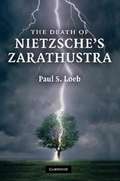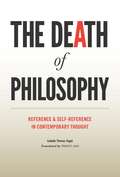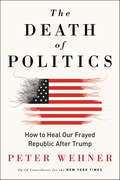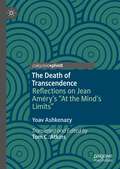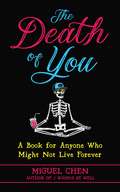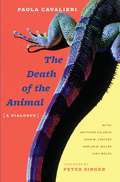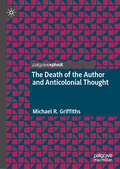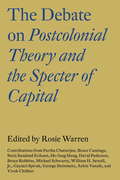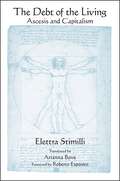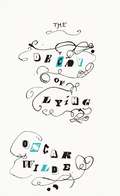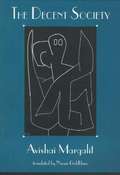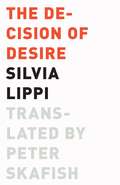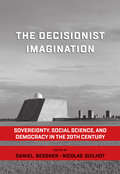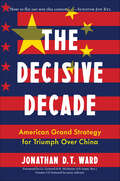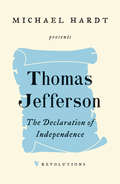- Table View
- List View
The Death Algorithm and Other Digital Dilemmas (Untimely Meditations #14)
by Roberto SimanowskiProvocative takes on cyberbullshit, smartphone zombies, instant gratification, the traffic school of the information highway, and other philosophical concerns of the Internet age. In The Death Algorithm and Other Digital Dilemmas, Roberto Simanowski wonders if we are on the brink of a society that views social, political, and ethical challenges as technological problems that can be fixed with the right algorithm, the best data, or the fastest computer. For example, the “death algorithm ” is programmed into a driverless car to decide, in an emergency, whether to plow into a group of pedestrians, a mother and child, or a brick wall. Can such life-and-death decisions no longer be left to the individual human? In these incisive essays, Simanowski asks us to consider what it means to be living in a time when the president of the United States declares the mainstream media to be an enemy of the people—while Facebook transforms the people into the enemy of mainstream media. Simanowski describes smartphone zombies (or “smombies”) who remove themselves from the physical world to the parallel universe of social media networks; calls on Adorno to help parse Trump's tweeting; considers transmedia cannibalism, as written text is transformed into a postliterate object; compares the economic and social effects of the sharing economy to a sixteen-wheeler running over a plastic bottle on the road; and explains why philosophy mat become the most important element in the automotive and technology industries.
The Death Penalty, Volume II
by Jacques Derrida Elizabeth RottenbergIn the first volume of his extraordinary analysis of the death penalty, Jacques Derrida began a journey toward an ambitious end: the first truly philosophical argument against the death penalty. Exploring an impressive breadth of thought, he traced a deeply entrenched logic throughout the whole of Western philosophy that has justified the state’s right to take a life. He also marked literature as a crucial place where this logic has been most effectively challenged. In this second and final volume, Derrida builds on these analyses toward a definitive argument against capital punishment. Of central importance in this second volume is Kant’s explicit justification of the death penalty in the Metaphysics of Morals. Thoroughly deconstructing Kant’s position—which holds the death penalty as exemplary of the eye-for-an-eye Talionic law—Derrida exposes numerous damning contradictions and exceptions. Keeping the current death penalty in the United States in view, he further explores the “anesthesial logic” he analyzed in volume one, addressing the themes of cruelty and pain through texts by Robespierre and Freud, reading Heidegger, and—in a fascinating, improvised final session—the nineteenth-century Spanish Catholic thinker Donoso Cortés. Ultimately, Derrida shows that the rationality of the death penalty as represented by Kant involves an imposition of knowledge and calculability on a fundamental condition of non-knowledge—that we don’t otherwise know what or when our deaths will be. In this way, the death penalty acts out a phantasm of mastery over one’s own death. Derrida’s thoughts arrive at a particular moment in history: when the death penalty in the United States is the closest it has ever been to abolition, and yet when the arguments on all sides are as confused as ever. His powerful analysis will prove to be a paramount contribution to this debate as well as a lasting entry in his celebrated oeuvre.
The Death of Death: The Scientific Possibility of Physical Immortality and its Moral Defense (Copernicus Books)
by David Wood José CordeiroIs death inevitable? Until now, the history of mankind has been marked by this fatal fact. Religions, borders and progress are born from an ancient fear of death, comfort from this fear man often found only in religious paradigms. But according to José Luis Cordeiro and David Wood, the incontrovertible fact of death is no longer an absolute certainty - science and technology are preparing to tear down the final frontier: that of immortality.This accessible book provides insight into recent exponential advances in artificial intelligence, tissue regeneration, stem cell treatment, organ printing, cryopreservation, and genetic therapies that, for the first time in human history, offer a realistic chance to solve the problem of the aging of the human body. In this book, Cordeiro and Wood not only present all the major developments, initiatives, and ideas for eternal life, they also show why there are a number of good arguments for seeing death for what it is: the last undefeated disease.Enter any drugstore or bookstore, and we confronted with a mountain of nonsense concerning the aging process. Society seems obsessed with aging. That is why The Death of Death is such a refreshing delight, able to cut through the hype and reveal a balanced, authoritative, and lucid discussion of this controversial topic. It summarizes the astonishing breakthroughs made recently in revealing how science may one day conquer the aging process.Michio Kaku, theoretical physicist and author of The God Equation: The Quest for a Theory of Everything We are entering a Fantastic Voyage into life extension, crossing different bridges that will take us to indefinite life spans. The Death of Death explains clearly how we might soon reach longevity escape velocity and live long enough to live forever. Ray Kurzweil, co-author of Fantastic Voyage: Live Long Enough to Live Forever and co-founder of Singularity University The Death of Death is a truly revolutionary book. This is a visionary book that confronts us with the terrible reality of aging, and its authors are friends and connoisseurs of the subject. I believe that the authoritative and exhaustive description of this crusade that José and David make in this excellent book will accelerate this process. Forward! Aubrey de Grey, founder of LEV (Longevity Escape Velocity) Foundation and co-author of Ending Aging
The Death of Desire: An Existential Study in Sanity and Madness
by M. Guy ThompsonA stunning exploration of the relation between desire and psychopathology, The Death of Desire is a unique synthesis of the work of Laing, Freud, Nietzsche, and Heidegger that renders their often difficult concepts brilliantly accessible to and usable by psychotherapists of all persuasions. In bridging a critical gap between phenomenology and psychoanalysis, M. Guy Thompson, one of the leading existential psychoanalysts of our time, firmly re-situates the unconscious – what Freud called "the lost continent of repressed desires" – in phenomenology. In so doing, he provides us with the richest, most compelling phenomenological treatment of the unconscious to date and also makes Freud’s theory of the unconscious newly comprehensible. In this revised and updated second edition to the original published in 1985, M. Guy Thompson takes us inside his soul-searching seven-year apprenticeship with radical psychiatrist R. D. Laing and his cohorts as it unfolded in counterculture London of the 1970s. This rite de passage culminates with a four-year sojourn inside one of Laing’s post-Kingsley Hall asylums, where Laing’s unorthodox conception of treatment dispenses with conventional boundaries between "doctor" and "patient." In this unprecedented exploration, Thompson reveals the secret to Laing’s astonishing alternative to the conventional psychiatric and psychoanalytic treatment schemes. Movingly written and deeply personal, Thompson shows why the very concept of "mental illness" is a misnomer and why sanity and madness should be understood instead as inherently puzzling stratagems that we devise in order to protect ourselves from intolerable mental anguish. The Death of Desire offers a provocative and challenging reappraisal of depth psychotherapy from an existential perspective that will be of interest to psychoanalysts, psychotherapists, philosophers, social scientists, and students of the human condition.
The Death of God and the Meaning of Life
by Julian YoungWhat is the meaning of life? In the post-modern, post-religious scientific world, this question is becoming a preoccupation. But it also has a long history: many major figures in philosophy had something to say on the subject, as Julian Young so vividly illustrates in this thought-provoking book. Part One of the book presents an historical overview of philosophers from Plato to Hegel and Marx who have believed in some sort of meaning of life, either in some supposed 'other' world or in the future of this world. Part Two looks at what happened when the traditional structures that provided life with meaning ceased to be believed. With nothing to take their place, these structures gave way to the threat of nihilism, to the appearance that life is meaningless. Julian Young looks at the responses to this threat in the work of Nietzsche, Heidegger, Sartre, Camus, Foucault and Derrida. This compelling and highly engaging exploration of fundamental values will captivate anyone who's ever asked themselves where life's meaning (if there is one) really lies. It also makes a perfect historical introduction to philosophy.
The Death of God and the Meaning of Life
by Julian YoungWhat is the meaning of life? In today's secular, post-religious scientific world, this question has become a serious preoccupation. But it also has a long history: many major philosophers have thought deeply about it, as Julian Young so vividly illustrates in this thought-provoking second edition of The Death of God and the Meaning of Life. Three new chapters explore Søren Kierkegaard’s attempts to preserve a Christian answer to the question of the meaning of life, Karl Marx's attempt to translate this answer into naturalistic and atheistic terms, and Sigmund Freud’s deep pessimism about the possibility of any version of such an answer. Part 1 presents an historical overview of philosophers from Plato to Marx who have believed in a meaning of life, either in some supposed ‘other’ world or in the future of this world. Part 2 assesses what happened when the traditional structures that give life meaning began to erode. With nothing to take their place, these structures gave way to the threat of nihilism, to the appearance that life is meaningless. Young looks at the responses to this threat in chapters on Nietzsche, Heidegger, Sartre, Camus, Foucault and Derrida. Fully revised and updated throughout, this highly engaging exploration of fundamental issues will captivate anyone who’s ever asked themselves where life’s meaning (if there is one) really lies. It also makes a perfect historical introduction to philosophy, particularly to the continental tradition.
The Death of Humanity: and the Case for Life
by Richard WeikartDo you believe human life is inherently valuable? Unfortunately, in the secularized age of state-sanctioned euthanasia and abortion-on-demand, many are losing faith in the simple value of human life. To the disillusioned, human beings are a cosmic accident whose intrinsic value is worth no more than other animals.The Death of Humanity explores our culture's declining respect for the sanctity of human life, drawing on philosophy and history to reveal the dark road ahead for society if we lose our faith in human life.
The Death of Nature: Women, Ecology and the Scientific Revolution
by Carolyn MerchantHow the scientific revolution sanctioned the exploitation of nature, commercial expansion, and the subjugation of women.
The Death of Nietzsche's Zarathustra
by Paul S. LoebIn this study of Nietzsche's Thus Spoke Zarathustra, Paul S. Loeb proposes a new account of the relation between the book's literary and philosophical aspects and argues that the book's narrative is designed to embody and exhibit the truth of eternal recurrence. Loeb shows how Nietzsche constructed a unified and complete plot in which the protagonist dies, experiences a deathbed revelation of his endlessly repeating life, and then returns to his identical life so as to recollect this revelation and gain a power over time that advances him beyond the human. Through close textual analysis and careful attention to Nietzsche's use of Platonic, Biblical, and Wagnerian themes, Loeb explains how this novel design is the key to solving the many riddles of Thus Spoke Zarathustra - including its controversial fourth part, its obscure concept of the Übermensch, and its relation to Nietzsche's Genealogy of Morals.
The Death of Philosophy: Reference and Self-reference in Contemporary Thought
by Isabelle Thomas-Fogiel Richard A. LynchPhilosophers debate the death of philosophy as much as they debate the death of God. Kant claimed responsibility for both philosophy's beginning and end, while Heidegger argued it concluded with Nietzsche. In the twentieth century, figures as diverse as John Austin and Richard Rorty have proclaimed philosophy's end, with some even calling for the advent of "postphilosophy." In an effort to make sense of these conflicting positions--which often say as much about the philosopher as his subject--Isabelle Thomas-Fogiel undertakes the first systematic treatment of "the end of philosophy," while also recasting the history of western thought itself.Thomas-Fogiel begins with postphilosophical claims such as scientism, which she reveals to be self-refuting, for they subsume philosophy into the branches of the natural sciences. She discovers similar issues in Rorty's skepticism and strands of continental thought. Revisiting the work of late-nineteenth and early-twentieth-century philosophers, when the split between analytical and continental philosophy began, Thomas-Fogiel finds both traditions followed the same path--the road of reference--which ultimately led to self-contradiction. This phenomenon, whether valorized or condemned, has been understood as the death of philosophy. Tracing this pattern from Quine to Rorty, from Heidegger to Levinas and Habermas, Thomas-Fogiel reveals the self-contradiction at the core of their claims while also carving an alternative path through self-reference. Trained under the French philosopher Bernard Bourgeois, she remakes philosophy in exciting new ways for the twenty-first century.
The Death of Philosophy: Reference and Self-reference in Contemporary Thought
by Isabelle Thomas-FogielPhilosophers debate the death of philosophy as much as they debate the death of God. Kant claimed responsibility for both philosophy's beginning and end, while Heidegger argued it concluded with Nietzsche. In the twentieth century, figures as diverse as John Austin and Richard Rorty have proclaimed philosophy's end, with some even calling for the advent of "postphilosophy." In an effort to make sense of these conflicting positions-which often say as much about the philosopher as his subject-Isabelle Thomas-Fogiel undertakes the first systematic treatment of "the end of philosophy," while also recasting the history of western thought itself.Thomas-Fogiel begins with postphilosophical claims such as scientism, which she reveals to be self-refuting, for they subsume philosophy into the branches of the natural sciences. She discovers similar issues in Rorty's skepticism and strands of continental thought. Revisiting the work of late-nineteenth and early-twentieth-century philosophers, when the split between analytical and continental philosophy began, Thomas-Fogiel finds both traditions followed the same path-the road of reference-which ultimately led to self-contradiction. This phenomenon, whether valorized or condemned, has been understood as the death of philosophy. Tracing this pattern from Quine to Rorty, from Heidegger to Levinas and Habermas, Thomas-Fogiel reveals the self-contradiction at the core of their claims while also carving an alternative path through self-reference. Trained under the French philosopher Bernard Bourgeois, she remakes philosophy in exciting new ways for the twenty-first century.
The Death of Politics: How to Heal Our Frayed Republic After Trump
by Peter WehnerThe New York Times opinion writer, media commentator, outspoken Republican and Christian critic of the Trump presidency offers a spirited defense of politics and its virtuous and critical role in maintaining our democracy and what we must do to save it before it is too late. “Any nation that elects Donald Trump to be its president has a remarkably low view of politics.” Frustrated and feeling betrayed, Americans have come to loathe politics with disastrous results, argues Peter Wehner. In this timely manifesto, the veteran of three Republican administrations and man of faith offers a reasoned and persuasive argument for restoring “politics” as a worthy calling to a cynical and disillusioned generation of Americans. Wehner has long been one of the leading conservative critics of Donald Trump and his effect on the Republican Party. In this impassioned book, he makes clear that unless we overcome the despair that has caused citizens to abandon hope in the primary means for improving our world—the political process—we will not only fall victim to despots but hasten the decline of what has truly made America great. Drawing on history and experience, he reminds us of the hard lessons we have learned about how we rule ourselves—why we have checks and balances, why no one is above the law, why we defend the rights of even those we disagree with. Wehner believes we can turn the country around, but only if we abandon our hatred and learn to appreciate and honor the unique and noble American tradition of doing “politics.” If we want the great American experiment to continue and to once again prosper, we must once more take up the responsibility each and every one of us as citizens share.
The Death of Transcendence: Reflections on Jean Améry’s “At the Mind’s Limits”
by Yoav AshkenazyThe Death of Transcendence presents a clear and compelling close reading and interpretation of the five essays included in Jean Améry’s At the Mind’s Limits, describing them as one continuous and progressing argument on the possibility of human society in the wake of the Holocaust. Through the thought of Ludwig Wittgenstein, Iris Murdoch, J.M. Bernstein and, Charles Taylor, Ashkenazy uncovers the importance and significance of such concepts as transcendence, lose, self, other, love, and home for establishing and maintaining a human life and world, and recovering it, should it be lost. Written with both clarity and academic rigour, this book offers novel ideas, firmly grounded in existing philosophical literature, and is intended for both professional scholars and general readers of Améry.
The Death of You: A Book for Anyone Who Might Not Live Forever
by Rod Meade Sperry Miguel ChenA yoga teacher, punk rock bassist, and Buddhist teaches from experience on how approaching death and grief with a little more compassion and a little less fear will make for a better life—and a better death, too.DEATH. Even the word itself probably makes you a little uncomfortable. Just look at it, sitting there, demanding to be acknowledged. It might even make you a lot uncomfortable. We spend so much time trying to deny death, going on about our lives as if we and our loved ones are immune to it. Then, one day, its truth becomes undeniable. The Death of You doesn’t flinch in looking into this vital, urgent matter. Join Miguel for a wild ride where we get real about death—and even have a few laughs at its expense. If you might someday die—or if you know someone who will—this book is for you. If you’re afraid of dying, this book is for you. If you’re excited about the Great Unknown, this book is for you. In plainspoken, kind, and encouraging language, Miguel will show you how to transform your relationship with death—and in doing so, you'll get to know your life in a whole new way. Today is the perfect day to start. Don’t wait—you’re not gonna live forever.
The Death of the Animal: A Dialogue
by Paola CavalieriWhile moral perfectionists rank conscious beings according to their cognitive abilities, Paola Cavalieri launches a more inclusive defense of all forms of subjectivity. In concert with Peter Singer, J. M. Coetzee, Harlan B. Miller, and other leading animal studies scholars, she expands our understanding of the nonhuman in such a way that the derogatory category of "the animal" becomes meaningless. In so doing, she presents a nonhierachical approach to ethics that better respects the value of the conscious self.Cavalieri opens with a dialogue between two imagined philosophers, laying out her challenge to moral perfectionism and tracing its influence on our attitudes toward the "unworthy." She then follows with a roundtable "multilogue" which takes on the role of reason in ethics and the boundaries of moral status. Coetzee, Nobel Prize winner for Literature and author of The Lives of Animals, emphasizes the animality of human beings; Miller, a prominent analytic philosopher at Virginia Polytechnic Institute, dismantles the rationalizations of human bias; Cary Wolfe, professor of English at Rice University, advocates an active exposure to other worlds and beings; and Matthew Calarco, author of Zoographies: The Question of the Animal from Heidegger to Derrida, extends ethical consideration to entities that traditionally have little or no moral status, such as plants and ecosystems. As Peter Singer writes in his foreword, the implications of this conversation extend far beyond the issue of the moral status of animals. They "get to the heart of some important differences about how we should do philosophy, and how philosophy can relate to our everyday life." From the divergences between analytical and continental approaches to the relevance of posthumanist thinking in contemporary ethics, the psychology of speciesism, and the practical consequences of an antiperfectionist stance, The Death of the Animal confronts issues that will concern anyone interested in a serious study of morality.
The Death of the Author and Anticolonial Thought
by Michael R. GriffithsThe Death of the Author and Anticolonial Thought promises to transform a decades old debate in literary studies about the relation between structure and agency, form and intention by giving a detailed account—previously unstudied—of the way colonized writers have responded to, learned from, and critiqued the death of the author postulate declared by Roland Barthes in 1967. The book is a cultural history of these debates—with a particular focus on two crucial two key case studies, Martinican poet and thinker Édouard Glissant and Palestinian literary and cultural critic Edward Said, this book, then, examines the immediate emergence and intensification of such responses to the postulate of the author’s deathly absence from the text, in order to suggest that metropolitan literary theory drew both critique and engagement from scholars of black, decolonial and Global South background from both before 1967 and Barthes’s declaration and in its wake. This book provides a focused account of the early history of the way global literatures have engaged with, critiqued, and occasionally adopted the lessons and limitations of the poststructuralist critique of that most fetishised and also reviled of figures: the author.
The Debate on Postcolonial Theory and the Specter of Capital
by Vivek Chibber Partha Chatterjee Gayatri Chakravorty Spivak Achin Vanaik Rosie WarrenLeading thinkers' critiques of award-winning Postcolonial Theory, as well as the author's responses and reformulationsVivek Chibber's Postcolonial Theory and the Specter of Capital was hailed on publication as "without any doubt ... a bomb," and "the most substantive effort to dismantle the field through historical reasoning published to date." It immediately unleashed one of the most important recent debates in social theory, ranging across the humanities and social sciences, on the status of postcolonial studies, modernity, and much else. This book brings together major critics of Chibber's work to assess the efficacy of his argument from differing perspectives. Included are Chibber's own spirited responses and reformulations in light of these criticisms. With contributions by Partha Chatterjee, Gayatri Spivak, Bruce Robbins, Ho-fung Hung, William H. Sewell, Jr., Bruce Cumings, George Steinmetz, Michael Schwartz, David Pederson, Stein Sundstøl Eriksen, and Achin Vanaik.
The Debt of the Living: Ascesis and Capitalism (SUNY series in Contemporary Italian Philosophy)
by Elettra StimilliMax Weber's account of the rise of capitalism focused on his concept of a Protestant ethic, valuing diligence in earning and saving money but restraint in spending it. However, such individual restraint is foreign to contemporary understandings of finance, which treat ever-increasing consumption and debt as natural, almost essential, for maintaining the economic cycle of buying and selling.In The Debt of the Living, Elettra Stimilli returns to this idea of restraint as ascesis, by analyzing theological and philosophical understandings of debt drawn from a range of figures, including Saint Paul, Schmitt and Agamben, Benjamin and Marx, Nietzsche and Freud, and Foucault. Central to this analysis is the logic of "profit for profit's sake"—an aspect of Weber's work that Stimilli believes has been given insufficient attention. Following Foucault, she identifies this as the original mechanism of a capitalist dispositif that feeds not on a goal-directed rationality, but on the self-determining character of human agency. Ascesis is fundamental not because it is characterized by renunciation, but because the self-discipline it imposes converts the properly human quality of action without a predetermined goal into a lack, a fault, or a state of guilt: a debt that cannot be settled. Stimilli argues that this lack, which is impossible to fill, should be seen as the basis of the economy of hedonism and consumption that has governed global economies in recent years and as the premise of the current economy of debt.
The Decay of Lying: The Decay Of Lying, Pen, Pencil And Poison, The Critic As Artist, The Truth Of Masks (Penguin Great Ideas)
by Oscar Wilde'Life imitates Art far more than Art imitates Life'The two works brought together here, 'The Decay of Lying' and 'The Critic as Artist', are Oscar Wilde's wittiest and most profound writings on aesthetics, in which he proposes that criticism is the highest form of creation and that lying, the telling of a beautiful untruth, is the ultimate aim of art.One of twenty new books in the bestselling Penguin Great Ideas series. This new selection showcases a diverse list of thinkers who have helped shape our world today, from anarchists to stoics, feminists to prophets, satirists to Zen Buddhists.
The Decent Society
by Avishai Margalit Naomi Goldblum<P>Avishai Margalit builds his social philosophy on this foundation: a decent society, or a civilized society, is one whose institutions do not humiliate the people under their authority, and whose citizens do not humiliate one another. <P>What political philosophy needs urgently is a way that will permit us to live together without humiliation and with dignity. Most of the philosophical attention nowadays is drawn to the ideal of the just society based on the right balance between freedom and equality. The ideal of the just society is a sublime one but hard to realize. The decent society is an ideal which can be realized even in our children's lifetime. We should get rid of cruelty first, advocated Judith Shklar. Humiliation is a close second. There is more urgency in bringing about a decent society than in bringing about a just one. Margalit begins concretely where we live, with all the infuriating acts of humiliation that make living in the world so difficult. He argues in a concrete way in the spirit of Judith Shklar and Isaiah Berlin. <P>This is a social philosophy that resists all those menacing labels that promote moral laziness, just as it urges us to get beyond the behavior that labels other human beings. Margalit can't be earmarked as liberal or conservative. If a label is necessary, then the most suitable is George Orwell's humane socialism, a far cry from Animal Farm socialism with its many tools of oppression. How to be decent, how to build a decent society, emerges out of Margalit's analysis of the corrosive functioning of humiliation in its many forms. This is a thoroughly argued and, what is much more, a deeply felt book that springs from Margalit's experience at the borderlands of conflicts between Eastern Europeans and Westerners, between Palestinians and Israelis.
The Decision of Desire (Univocal)
by Silvia LippiA unique rereading of Lacan&’s theory of desire and its link to masochism, joy, mysticism, death, and feminine jouissance Of all of Lacan&’s reconceptualizations of Freudian psychoanalytic discourse, the most misunderstood are those concerning human beings&’ relation to the unconscious play of desire and the neurosis stemming from their attachment to the phallic function. An interpretive tour de force that engages works by surrealists such as André Breton, canonical writers like William Faulkner and James Joyce, and the philosophers Jean-Paul Sartre, Emmanuel Levinas, and Baruch Spinoza, The Decision of Desire is groundbreaking in its proposal that each of us can seek out and reimagine our relation to the infinite aporias of desire and thereby detach from its destructive, repetitive forms in favor of joy and affirmation. Providing insight to the lay reader of psychoanalytic theory as much as to practicing psychoanalysts, The Decision of Desire is a bold reengagement with the legacy of the notion of desire within psychoanalysis and the quandary of how to assume responsibility for desires. For if desire is always already that of the Other and the unconscious, and also a decision that escapes our consciousness of ourselves, how can we assume an ethical relation to it that avoids the vicious circle of disappointment, neurosis, and destruction? Such is the decision of desire attempted within Silvia Lippi&’s profound development of a contemporary psychoanalytic thought.
The Decisionist Imagination: Sovereignty, Social Science and Democracy in the 20th Century
by Nicolas Guilhot Daniel BessnerIn the decades following World War II, the science of decision-making moved from the periphery to the center of transatlantic thought. The Decisionist Imagination explores how “decisionism” emerged from its origins in prewar political theory to become an object of intense social scientific inquiry in the new intellectual and institutional landscapes of the postwar era. By bringing together scholars from a wide variety of disciplines, this volume illuminates how theories of decision shaped numerous techno-scientific aspects of modern governance—helping to explain, in short, how we arrived at where we are today.
The Decisive Decade: American Grand Strategy for Triumph Over China
by Jonathan D. WardWith a focus on the economic battlefront and in-depth analysis of the diplomatic, military, and ideological arenas, the world’s foremost expert on US-China global competition offers a rousing, strategic call to action and playbook—harvesting all of our nation’s ingenuity, confidence, and will power—to outcompete the long-term strategies of China and its Communist Party. In The Decisive Decade, Dr. Jonathan D.T. Ward—China scholar and founder of the Atlas Organization, a consultancy focused on US-China global competition—offers a comprehensive framework for how the United States can, and must, defeat China on the world stage economically, diplomatically, militarily, and ideologically. International security and American supremacy are at stake—and now is the time for the US to take action. China’s global power and influence grows every day. Working from a deep sense of national identity, the Chinese Communist Party is leading its country toward what it deems “the great rejuvenation of the Chinese Nation,” and executing a long-term Grand Strategy to topple over its chief adversary, the United States. As China becomes increasingly repressive domestically and aggressive overseas, it threatens to upend America’s global dominance at every turn. Ward provides novel and practical strategies that our government, as well as our businesses and our citizens, can utilize to undermine our adversary. Exhaustive campaigns in the economic, diplomatic, military, and ideological arenas, he argues, must be taken to achieve victory. With expert analysis of the history of US-China relations, as well as insight into how the Russia-Ukrainian war can inform our strategic thinking, The Decisive Decade presents a unique toolkit for our triumph over China. We can succeed, but it won’t be easy; it will take all of our nation’s ingenuity, confidence, and willpower to win.
The Declaration of Independence: Thomas Jefferson's Manuscript Draft From The Collections Of The American Philosophical Society (Books Of American Wisdom Ser.)
by Thomas JeffersonCo-author of the groundbreaking Empire and Multitude, Michael Hardt examines the Declaration of Independence and other texts by Jefferson, arguing that his powerful concept of democracy provides a biting critique of the current American administration. Introducing this collection of Jefferson&’s writings, Michael Hardt makes a powerful case for re-examining the foundational writings of this American revolutionary in order to reignite the dialogue that first conceived of a &“land of the free.&”
